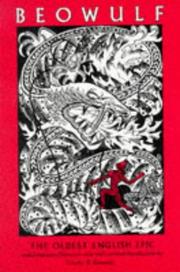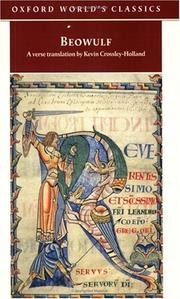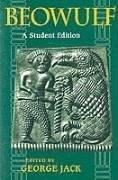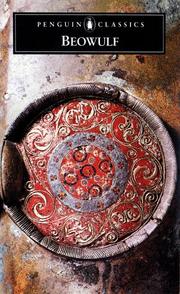| Listing 1 - 10 of 39 | << page >> |
Sort by
|

ISBN: 0385062133 Year: 1977 Publisher: Garden City Anchor
Abstract | Keywords | Export | Availability | Bookmark
 Loading...
Loading...Choose an application
- Reference Manager
- EndNote
- RefWorks (Direct export to RefWorks)

ISBN: 0195024354 Year: 1978 Publisher: London Oxford university
Abstract | Keywords | Export | Availability | Bookmark
 Loading...
Loading...Choose an application
- Reference Manager
- EndNote
- RefWorks (Direct export to RefWorks)

ISBN: 1281346535 0191567140 0585366071 9780585366074 9786611346539 6611346538 0192833200 9780192833204 9780191567148 9781281346537 Year: 1999 Publisher: Oxford New York Oxford University Press
Abstract | Keywords | Export | Availability | Bookmark
 Loading...
Loading...Choose an application
- Reference Manager
- EndNote
- RefWorks (Direct export to RefWorks)
Beowulf is the longest and finest literary work to have come down to us from Anglo-Saxon times, and one of the world's greatest epic poems. Set in the half-legendary, half historical Scandinavian past, it tells the story of the hero Beowulf, who comes to the aid of the Danish king Hrothgar by killing first the terrifying, demonic monster Grendel, and then Grendel's infuriated and vengeful mother. A lifetime later, Beowulf's own kingdom, Geatland, isthreatened by a fiery dragon; Beowulf heroically takes on this challenge, but himself dies killing the dragon.The poem celebrates the virtues of the heroic life, but Hrothgar and Beowulf are beacons of wisdom and courage in a dark world of feuds, violence and uncertainty, and Beowulf's selfless heroism is set against a background of ruthless power struggles, fratricide and tyranny.
English poetry --- Epic poetry, English (Old) --- Anglo-Saxon epic poetry --- English epic poetry, Old --- Epic poetry, Anglo-Saxon --- Old English epic poetry
Book
ISBN: 3111358003 9783111358000 Year: 2017 Publisher: Berlin Boston
Abstract | Keywords | Export | Availability | Bookmark
 Loading...
Loading...Choose an application
- Reference Manager
- EndNote
- RefWorks (Direct export to RefWorks)
Epic poetry, English (Old) --- Anglo-Saxon epic poetry --- English epic poetry, Old --- Epic poetry, Anglo-Saxon --- Old English epic poetry --- English poetry
Book
ISBN: 1282413465 9786612413469 1443809500 9781443809504 9781443805582 1443805580 9781282413467 6612413468 Year: 2009 Publisher: Newcastle upon Tyne, U.K. : Cambridge Scholars Pub.,
Abstract | Keywords | Export | Availability | Bookmark
 Loading...
Loading...Choose an application
- Reference Manager
- EndNote
- RefWorks (Direct export to RefWorks)
The epic fragments of Waldere yield some of the earliest lore dealing with migration-period heroes such as Attila the Hun, Theodoric the Ostrogoth, Walter son of Ælfhere, and Gunther and Hagen of the Nibelungs, while at the same time expressing the politi
Epic poetry, English (Old) --- English poetry --- Anglo-Saxon epic poetry --- English epic poetry, Old --- Epic poetry, Anglo-Saxon --- Old English epic poetry --- Criticism, Textual. --- History and criticism. --- Waldere --- Waldhere --- Вальдэрэ --- Valʹdėrė --- Вальдере --- Criticism and interpretation.
Book
ISBN: 1283897253 0812204409 081222275X 0812243455 Year: 2011 Publisher: Philadelphia : University of Pennsylvania Press,
Abstract | Keywords | Export | Availability | Bookmark
 Loading...
Loading...Choose an application
- Reference Manager
- EndNote
- RefWorks (Direct export to RefWorks)
The best-known literary achievement of Anglo-Saxon England, Beowulf is a poem concerned with monsters and heroes, treasure and transience, feuds and fidelity. Composed sometime between 500 and 1000 C.E. and surviving in a single manuscript, it is at once immediately accessible and forever mysterious. And in Craig Williamson's splendid new version, this often translated work may well have found its most compelling modern English interpreter.Williamson's Beowulf appears alongside his translations of many of the major works written by Anglo-Saxon poets, including the elegies "The Wanderer" and "The Seafarer," the heroic "Battle of Maldon," the visionary "Dream of the Rood," the mysterious and heart-breaking "Wulf and Eadwacer," and a generous sampling of the Exeter Book riddles. Accompanied by a foreword by noted medievalist Tom Shippey on Anglo-Saxon history, culture, and archaeology, and Williamson's introductions to the individual poems as well as his essay on translating Old English, the texts transport us back to the medieval scriptorium or ancient mead hall to share an exile's lament or herdsman's recounting of the story of the world's creation. From the riddling song of a bawdy onion that moves between kitchen and bedroom, to the thrilling account of Beowulf's battle with a treasure-hoarding dragon, the world becomes a place of rare wonder in Williamson's lines. Were his idiom not so modern, we might almost think the Anglo-Saxon poets had taken up the lyre again and begun to sing after a silence of a thousand years.
Epic poetry, English (Old) --- Dragons --- Monsters --- Anglo-Saxon epic poetry --- English epic poetry, Old --- Epic poetry, Anglo-Saxon --- Old English epic poetry --- English poetry --- History and criticism. --- Beowulf --- Bjowulf --- Scandinavia --- Cultural Studies. --- Literature. --- Medieval and Renaissance Studies. --- Poetry.
Book
ISBN: 1641894741 1641894709 Year: 2021 Publisher: Leeds : Arc Humanities Press,
Abstract | Keywords | Export | Availability | Bookmark
 Loading...
Loading...Choose an application
- Reference Manager
- EndNote
- RefWorks (Direct export to RefWorks)
This is a community translation of the earliest English epic poem. Beowulf tells the story of a mythical hero in northern Europe in, perhaps, the sixth century. Alongside his story, multiple other shorter narratives are told and many other voices are heard, making it a rich and varied account of the poet's views of heroism, conflict, loyalty and the human condition. The poem is widely taught in schools and universities, and has been adapted, modernized, and translated dozens of times, but this is the first large-scale polyvocal translation. Readers will encounter the voices of over two-hundred individuals, woven together into a reading experience that is at once productively dissonant, yet strangely coherent in its extreme variation. We hope that it turns the common question "Why do we need yet another translation?" on its head, asking instead, "How can we hear from more translators?," and "How can previously unheard, or marginalised voices, find space, like this, in the world of Old English Studies?" With this in mind we invite a new generation of readers to try their own hand at translating Beowulf in the workbook space provided opposite this community translation. It is often through the effort of translating that we see the reality of the original.
Epic poetry, English (Old). --- LITERARY CRITICISM / Medieval. --- Beowulf. --- Old English literature. --- community translation. --- medieval poetry. --- translation methods. --- Anglo-Saxon epic poetry --- English epic poetry, Old --- Epic poetry, Anglo-Saxon --- Old English epic poetry --- English poetry

ISBN: 0198710437 0198710445 9780198710448 Year: 1994 Publisher: Oxford Clarendon
Abstract | Keywords | Export | Availability | Bookmark
 Loading...
Loading...Choose an application
- Reference Manager
- EndNote
- RefWorks (Direct export to RefWorks)
Epic poetry, English (Old) --- Poésie épique anglaise --- Vieil anglais --- Epic poetry, English (Old). --- Anglo-Saxon epic poetry --- English epic poetry, Old --- Epic poetry, Anglo-Saxon --- Old English epic poetry --- English poetry --- Old English literature --- Epic poetry [English ] (Old) --- Beowulf --- Fight at finnsburh, the
Book
ISBN: 0824095308 Year: 1980 Publisher: New York, NY : Garland,
Abstract | Keywords | Export | Availability | Bookmark
 Loading...
Loading...Choose an application
- Reference Manager
- EndNote
- RefWorks (Direct export to RefWorks)
Dragons in literature --- -Epic poetry, English (Old) --- -Heroes in literature --- -Monsters in literature --- -Bibliography --- History and criticism --- Bibliography --- Beowulf --- Scandinavia --- Fennoscandia --- Norden --- Nordic countries --- In literature --- -Bibliography. --- Epic poetry, English (Old) --- Heroes in literature --- Monsters in literature --- Anglo-Saxon epic poetry --- English epic poetry, Old --- Epic poetry, Anglo-Saxon --- Old English epic poetry --- English poetry --- History and criticism&delete& --- Bibliography.

ISBN: 0140442685 9780140442687 Year: 1973 Publisher: Harmondsworth Penguin books
Abstract | Keywords | Export | Availability | Bookmark
 Loading...
Loading...Choose an application
- Reference Manager
- EndNote
- RefWorks (Direct export to RefWorks)
Old English literature --- -Heroes --- -Monsters --- -Freaks --- Monsters, Double --- Monstrosities --- English epic poetry, Old --- Epic poetry, Anglo-Saxon --- #GGSB: Literatuur (letterkunde) --- #GGSB: Poezie --- Epic poetry, English (Old) --- Dragons --- Heroism --- Anglo-Saxon epic poetry --- Old English epic poetry --- Poetry --- Heroes --- Monsters --- English poetry --- Persons --- Antiheroes --- Apotheosis --- Courage --- Modernized versions --- Literatuur (letterkunde) --- Poezie --- Epic poetry, English (Old) - Modernized versions
| Listing 1 - 10 of 39 | << page >> |
Sort by
|

 Search
Search Feedback
Feedback About UniCat
About UniCat  Help
Help News
News